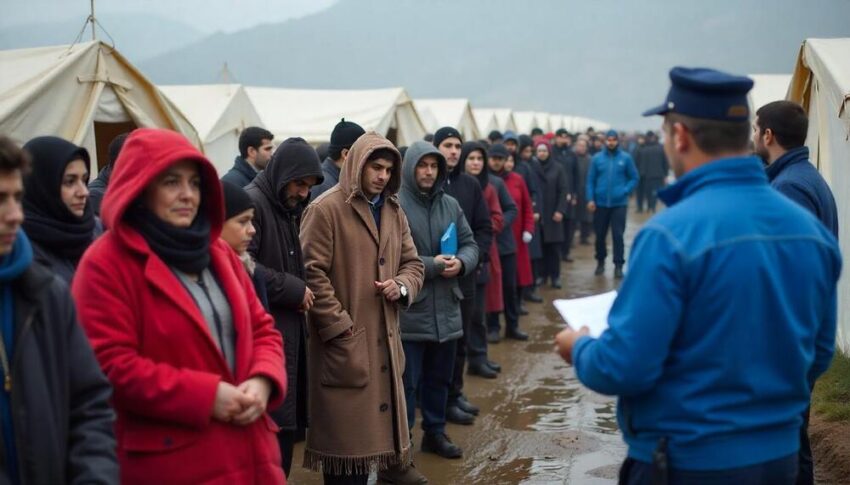Sunday, July 20, 2025

n a dramatic response to the growing number of migrants arriving from North Africa, Greece has begun detaining African migrants as it enforces a freeze on asylum applications. This comes amid a surge in migrant arrivals, with record-breaking numbers reaching Greek shores, particularly from Libya and other North African regions. The government’s decision to freeze asylum applications and detain incoming migrants has sparked significant tension, both domestically and internationally, as the country grapples with the pressure of managing this rising influx.
Greece has detained its first group of migrants since the government implemented a controversial freeze on asylum applications. The 190 migrants, who arrived on the southern shores of Crete, were detained by Greek authorities as they do not meet the requirements to apply for asylum under the new regulations. A fourth group of 11 migrants was also discovered near the island of Agathonisi, located near Turkey’s coast.
Among those detained, one individual was found injured and later passed away in the hospital, bringing further attention to the dangers migrants face during their journeys across the Mediterranean. This incident has raised serious concerns about the safety of those making these perilous sea crossings.
Rising Migrant Arrivals and Government Response
Greece has witnessed a significant increase in migrant arrivals, particularly from Libya, with Crete becoming one of the primary landing points. The island, home to Prime Minister Kyriakos Mitsotakis, has seen more than 2,000 migrant arrivals in July alone. The growing number of arrivals has led to mounting frustration among local officials and tourism operators, who have pressured the government to take action to control the flow of migrants.
In response to the surge, the Greek government has imposed a three-month suspension on asylum applications from migrants arriving by sea from North Africa. This decision is part of a broader strategy to stem the tide of illegal migration, as Greece grapples with the challenges posed by increasing numbers of migrants arriving on its shores.
New Legislative Measures on Migrant Detention
The Greek Migration Ministry has prepared new legislation that would allow for the detention of migrants for up to two years for illegal entry into the country. Additionally, migrants caught staying in Greece illegally would face detention for up to five years under the new laws. These legislative measures are designed to establish a more stringent immigration framework and ensure greater enforcement of Greece’s border controls.
Minister of Migration, Notis Mitarachi, emphasized the government’s position, stating that individuals entering Greece illegally would face a regime of surveillance rather than hospitality. This tough stance reflects the government’s growing concern over the rising number of illegal entries and the strain it places on Greece’s resources and social systems.
Concerns from Local Authorities and Human Rights Groups
The freeze on asylum applications and the detention of migrants have been met with both domestic and international criticism. Local officials in Crete, particularly in the tourism sector, have expressed concerns about the impact of rising migrant arrivals on the local economy. Tourism operators, who depend on a steady flow of visitors, worry that the increasing number of migrants could damage the island’s reputation as a holiday destination.
On the international stage, human rights organizations have condemned Greece’s decision to suspend asylum applications. These groups argue that the policy could lead to the violation of international law, as migrants fleeing conflict or persecution would be denied the opportunity to seek asylum. Amnesty International and other organizations have raised alarms about the potential humanitarian consequences of Greece’s hardline stance on migration.
The EU’s Response and Legal Implications
The European Union has also expressed concern over Greece’s actions, with some suggesting that the suspension of asylum applications could undermine the EU’s commitment to refugee rights. Greece’s decision to introduce laws allowing for longer detention periods has raised questions about whether these measures comply with European human rights standards.
The situation is further complicated by the European Union’s role in funding and supporting Greece’s border control initiatives. While the EU has provided financial assistance to Greece for managing migration, the increasingly restrictive policies being implemented by the Greek government may put the country at odds with EU institutions and other member states that advocate for more compassionate and humane treatment of migrants.
Looking Ahead: Greece’s Path Forward
As Greece moves forward with its stricter immigration policies, questions remain about the long-term impact on the country’s relationship with the European Union, its reputation on the world stage, and the future of its migration system. While the government maintains that these measures are necessary to preserve national security and control illegal migration, critics argue that they could exacerbate humanitarian concerns and lead to further tensions with international organizations.
The debate over Greece’s migration policies is far from over, and it is clear that the country will continue to face significant pressure from both domestic and international sources to balance border security with the rights of migrants seeking refuge. As the situation develops, the future of Greece’s asylum policies will remain a contentious issue, one that will likely shape the country’s political landscape for years to come.







